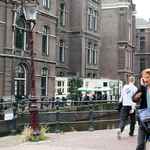Surveillance Microcosms: A GDC Masterclass by Dr Mathias Klang
- Date
- 4 December 2023
- Time
- 15:00 -17:00
- Location
- BG 2
- Room
- BG2 0.08
One of the side effects of surveillance capitalism’s drive to collect endless amounts of data about us is the rise in large amounts of technological apps, platforms, and gadgets available at low cost to the consumer. These technologies, when implemented as such, are able to provide the user with a sophisticated infrastructure of surveillance for the monitoring of themselves, their family, friends, property, and neighborhood—essentially turning each of us into the equivalent of surveillance microcosms. The focus of this work is to study the function and impact of surveillance microcosms in relation to seven different situations that illustrate different functions of surveillance: (1) from fetus to toddler, (2) from child to teenager, (3) monitoring the self, (4) surveillance of lovers and partners, (4) observing friends, (5) parasocial monitoring, (6) watching the neighborhood, and (7) surveillance of older family members.
Through the study of these surveillance microcosms, we gain a deeper understanding of the multifaceted nature of surveillance as not the one-dimensional instrument of power and control. Surveillance can be resisted, embraced, used as punishment or reward, a form of entertainment, or a language of love, and ultimately, it shapes who we are and our relations to others. The contribution of this project is to turn its lens away from state or corporate surveillance and focus on the mundane, everyday uses of technology that make up our daily lives and, through this, illustrate the implications of the choices that open up when we use our technology. These choices, together with the technological affordances, constraints, preconditions, and unintended consequences are shaping our lives and interactions today.
Bio
Mathias Klang is an associate professor at Fordham University where he studies mainly in the fields of surveillance and resistance. He is currently a visiting Fulbright scholar at the University of Bergen where he is working on a book on surveillance. Much of Dr Klang's previous work has been on the regulation of democracy by technology and the application of resistance theories in the digital realm.
